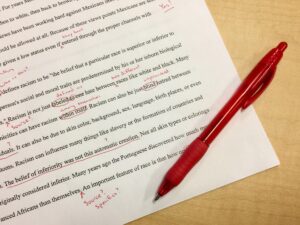 By Elaine Viets
By Elaine Viets
Here’s one reason why I like my London publisher, Severn House: Editing.
Like most writers, I try to turn in clean copy. I’m also an editor myself. So I appreciate the masterful way Severn House edited my latest Angela Richman mystery, Late for His Own Funeral, due out in the US this November. The editors took care to fine-tune the sentences with small but significant changes.
Take a look at these. The way I wrote the selection is first. The edited version is second.
(1) In this first example, Angela is recalling her friend’s doomed married. The change helps set the scene.
Elaine: Back then, Sterling had seemed awed by Camilla’s cool elegance, and she fell in love with his humor and energy.
Severn House: When they first met, Sterling had seemed awed by Camilla’s cool elegance, and she fell in love with his humor and energy.
 (2) Elaine: I walked over to him and looked right into his red eyes. We were both the same height.
(2) Elaine: I walked over to him and looked right into his red eyes. We were both the same height.
Severn House: I walked over to him and looked right into his red eyes. We were the same height.
This change gets rid of a redundancy. If Angela could look the man in the eyes, then they were the same height. I didn’t need that “both.”
 (3) Elaine: The cut on her forehead had been stitched. She’d have a heck of a bruise there tomorrow.
(3) Elaine: The cut on her forehead had been stitched. She’d have a heck of a bruise there tomorrow.
Severn House: The cut on her forehead had been stitched. She’d have a heck of a bruise there.
I didn’t need that “tomorrow.”
(4) This change makes the sentence sing.
Elaine: The child wore a pink polka-dot T-shirt and jeans, and had pink ribbons in her hair.
My editor rearranged it as:
Severn House: The child wore jeans and a pink polka-dot T-shirt, and had pink ribbons in her hair.
(5) Here’s a shorter way of saying the same thing:
Elaine: We were at my car now.
Severn House: We reached my car.
 (6) Elaine: I fired up my iPad and opened up the Death Scene Investigation form.
(6) Elaine: I fired up my iPad and opened up the Death Scene Investigation form.
Severn House: I fired up my iPad and opened the Death Scene Investigation form.
No need for that second “up.”
(7) Another unnecessary phrase bites the dust:
Elaine: “It’s going to be rough for a bit,” I said. “But you’ll get through it. I promise. You have a real advantage – one of the best lawyers in the Midwest.”
With that, Mrs. Ellis entered the room carrying a tray. “I’ve brought you some food, Camilla dear.”
Severn House: “It’s going to be rough for a bit,” I said. “But you’ll get through it. I promise. You have a real advantage – one of the best lawyers in the Midwest.”
Mrs. Ellis entered the room carrying a tray. “I’ve brought you some food, Camilla dear.”
(8) This small change makes for a cleaner sentence.
Elaine: I was on duty at midnight tonight, so I packed a small overnight bag with my DI uniform and added my office cell phone charger.
Severn House: I was on duty at midnight, so I packed a small overnight bag with my DI uniform and added my office cell phone charger.
(9) Elaine: Millie watched fascinated while the server mixed the ingredients together in a large glass bowl, then added the dressing and tossed the salad.
Severn House: Millie watched fascinated while the server mixed the ingredients in a large glass bowl, then added the dressing and tossed the salad.
If the ingredients were mixed in a bowl, naturally they’d be “together.”
(10) Here’s another two-letter change:
Elaine: Linda’s apartment, 615, was in the middle of the hall. I could hear the TV on and hoped Linda was home.
No need for that “on.” If I could hear the TV, it was definitely on.
(11) One last one-word change.
Elaine: I went home to my place, feeling discouraged. Chris and I didn’t have a fight. I just wanted to be alone tonight.
Severn House: I went home to my place, feeling discouraged. Chris and I didn’t have a fight. I just wanted to be alone
Most of these changes were small and subtle. Also, I don’t have to accept any that I don’t like. Some got lost in translation when they crossed the Atlantic. Like this one:
Angela says: “I was a bridesmaid in her wedding ten years ago, and we marched down the same aisle now blocked by her husband’s casket.”
The copyeditor had changed it to: “I was a bridesmaid ‘at’ her wedding.” I had to explain that if you’re “at a wedding” you’re attending it, while if you’re “in a wedding,” you’re an attendant.
Sometimes we truly are two countries divided by a common language.
 Now hear this: My Dead-End Job mysteries Murder with Reservations, Clubbed
Now hear this: My Dead-End Job mysteries Murder with Reservations, Clubbed
to Death, Murder Unleashed and Killer Cuts are now on Scribd.com. Listen to them during your 30-day free trial.

Thank you, Elaine, for that really interesting peek behind the curtain.
Thanks, Elaine. Great post showing the importance of an editor. I love all those little adverbs that show where we live, different ones for different regions. There’s a commercial for Nutrisystem where Marie says everything has been “portioned out.”
Good luck with the launch of Late for His Own Funeral.
Hm. I see my editor behind Marie with a giant red pencil, Steve, ready to cut that “out.”
Little changes can make a big difference. While the “before” versions probably wouldn’t create hiccups for readers, the tighter “after” version is giving them a better reading experience. Thanks for sharing.
I’m impressed with the care the copyeditor took with this manuscript, Terry.
Editing is very important. I just started a novel last night and in the first handful of pages began to wonder if it had been edited at all. Editing is definitely NOT one of the aspects of the writing process to skip. And I’m thankful that, whether formal editor or not, we have people who can be a second pair of eyes for us to catch what we miss.
You bet, BK. Another pair of eyes or two can see what we can’t. No one wants to admit their baby has flaws.
I’m appalled by some of the editing by the conglomerate publishers. Some of the errors are truly embarrassing. If I were one of their authors and made enough money, I’d pay to have my books edited before I sent my final version.
I’ve seen some terrible editing by the Big Five (or is it four now)? One bestselling author threw his clothes down the laundry “shoot.” Another saw a “grizzly murder.” Those bears are dangerous.
William Zinsser called those little words “clutter.” Sol Stein called them “flab.” Any way you look at it, cutting them always improves a sentence.
Clutter and flab. I bet editors dream about them.
Love those words, Jim.
Love those words, Jim.
Thanks for sharing this information with us, Elaine. Such small changes make such a big difference to the reader.
Good luck with the release of “Late for His Own Funeral.” I love the title!
An interesting post, Elaine, and a good wake-up as to how important other eyes are for our ms health. I’ve never been chosen to enter the “Forbidden City” as Jim rightly calls it, so I’m on my indie own when it comes to editing. I recently upgraded to the newest Office version, and I’m impressed as to its newest auto-correct/suggest features. My next stop is over at Grammarly Premium which does some more cleanup but I’ll never forgo sending the best-I-can-do to my human proofreader. Artificial Intelligence apps are fine and dandy but nothing beats a 70-year-old lady who’s not scared to let me know a thing or two. Enjoy your day!
Yep. AI can make some good catches, but you need that human contact, Garry.
Love those words, Jim. Fingers crossed for the new book, Kay.
Elaine – Love slicing the extraneous or restating more effectively with better flow/clarity. Great examples.
In addition to your ongoing great Scribd deal TKZers can grab a free kindle version of James Scott Bell’s “Your Son Is Alive (A Thriller)” on Amazon today.
TKZ author-ninjas providing both high-quality writing instruction and outstanding reading/listening for free – Thank you!
Good to know, Tom. And can I add that I like your books, too? I really enjoyed “Nerve Damage.”
Elaine –
Thrilled you’ve enjoyed my books.
Recently informed book #4 in my series is a finalist in MN Book Awards (named with Wm Kent Krueger and 2 other nationally bestselling, trad published authors). Surprising and fun.
Regarding editing…another TKZ contributor Jodie Renner has been my editor. Great feeling to get suggestions such as you shared…making the changes on the working manuscript is a pleasure.!
Woo-hoo! TKZers, if you like fast-paced medical mysteries, treat yourself to Tom’s novels. Your books are in good hands with Jodie, Tom.
I’ve had good editors, bully editors, and editors so bad they have littered my book with embarrassing errors. One tried to fight me on commas, she would toss them in like confetti, and I reminded her that I was the English teacher, not her, so she backed down. A friend’s editor decided that “blond” was an adjective, and “blonde” was a noun. Gender had nothing to do with the words. You could always tell which books this woman edited because of that error. Thankfully, she didn’t last long.
I’ve had good and bad ones, Marilyn, so I cherish the good one I have now. I’ve had some epic fights with the bad ones throughout my career.
Ah those small changes that help the words flow smoothly. Brava!
Thanks, Mary. As a professional storyteller, you know all about making the words flow.
Great advice, Elaine. Editors make us all look good. ?
The good ones are much underappreciated, Sue.
You look good without any editing, Sue.
*blush* Thanks, BFF.
I’ve never met an edit that I didn’t embrace…eventually. But then, I’ve had really good editors. 🙂 Good post!
You’re lucky, Patricia. Early in my writing career I ignored an editor’s suggestion that I cut a scene. When I read the book audio, I realized she was right.
Thanks Elaine, Hope all is well!